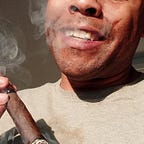Being “good”
I spend a lot of time in my headspace or in a book, pondering the contents. These two places cause a lot of random thoughts to flow between them in an odd manner. Are these ideas truly mine, or are they borrowed from others? Would I have come to these conclusions naturally, or am I so devoid of imagination and curiosity that without being led to thought like a bull by a nose-ring that it would go forever unpondered?
One of the things I have been tumbling in my mind is the nature of “what does it mean to be ‘good’?” More importantly, do I truly care?
It is, on the surface, easy to say that we care about being good people. It is easy to say that we want to be good people. It takes a bit of self-delusion to tell ourselves that we are good people, especially considering that even the most dull man has some awareness of the areas in which he is not, by any metric (but especially his own), good. I ask if I care, because how often have I had the choice between goodness and wickedness and I have chosen to be wicked, knowing that it was wicked and — worse — that goodness would have only inconvenienced me at most?
Does any man even need to care? How many of us have slipped through life not pondering the nature of their own morality, simply blindly adhering to the moral codes that others bestow upon them? How much easier would life be if we were handed an external code where the critical and painful process of self-discovery were unnecessary? Isn’t a life free of internal conflict and pain preferable to one where even pain may not result in a satisfactory conclusion? How many philosophers wrestle with their demons at night while pious men who follow the values of others sleep soundly?
How many of us have idly existed without so much as a second thought to our own internal moral code, and how it may be at odds with the lives that we claim we want to live? Have their lives been negatively affected in any way noticeable to them? Does the thief who steals out of desire (as opposed to necessity) feel regret? Does the drunkard feel shame? Does the rapist feel guilt? Those who do not give their moral code a second thought face scorn and derision from outside forces, but do their inner selves even balk at the things they do, think, or feel? How much happier are they than those of us who question the morality of our choices and feel the weight of every decision, no matter if it hurts an ant or a man?
What is the use of the good? Is it for society? A tragedy of the commons looms over us like Damocles’ sword — a man who is good for the sake of society enables those who deny goodness an opportunity to reap the benefits much in the way a mold quickly consumes good food if left unchecked. Is his goodness for himself? If so, would he not be better served choosing what makes him happy rather than seeking the pain of moral tumult?
So I find myself asking, do I care about being good?
